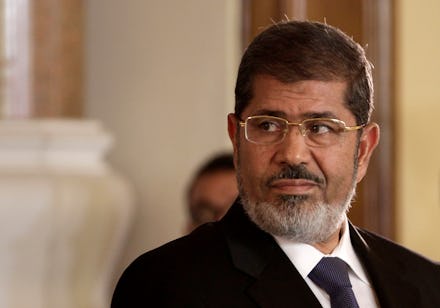How This Man Went From President to "Terrorist"

The political winds are continuing to shift in Egypt. On Dec. 18, Egypt's ousted President Mohamed Morsi was accused of collaborating with "foreign organizations to commit terrorist acts inside of Egypt." And a day later, former President Hosni Mubarak's sons and his prime minister, Ahmed Shafiq, were acquitted of corruption charges.These developments, which Human Rights Watch described as "fantastical," are the latest of the military's efforts to completely dismantle the Muslim Brotherhood.
Over the last year and a half, Morsi experienced a swift fall from his place as Egypt's first elected president to alleged terrorist. Looking back, his presidency faced a myriad of challenges with the military's hold on power, a lagging economy, and an unstable security situation. Add to that Morsi's missteps and autocratic measures, and his demise seemed inevitable.
Morsi, a member of the Muslim Brotherhood, ran as the presidential candidate for the group's Freedom and Justice Party in the first elections post-Mubarak. In June 2012, he defeated Shafiq in a run-off with almost 52% of the votes. Egyptian Journalist Ala'a al-Aswany argued that Morsi's election was not necessarily a result of Egyptians supporting him, but a vote "simply to prevent the restoration of Mubarak's regime at the hands of Shafiq."
(Morsi on election night) AP
Early in his presidency, Morsi's criticism of the Supreme Council of the Armed Forces (SCAF) "had a positive impact on public perception" and his election symbolized a victory for the revolution and political transition, Zaid Akl argued earlier this year in Daily News Egypt. Morsi took measures to curb the SCAF's influence over the government. In August 2012, his constitutional declaration sent the two highest ranking generals into retirement and returned executive and legislative power to the president.
However, Morsi's rule would quickly take on a more dictatorial character as he moved to consolidate his power and the influence of the Muslim Brotherhood. He began restricting press freedom and imprisoning detractors. Opposition parties demanded for him to reorganize the Islamist-dominant Constituent Assembly to be more inclusive.
In November 2012, Morsi issued a decree that proved to be one of his most significant missteps and ignited mass large protests. The decree included provisions that made his declarations and laws outside the purview of judicial review, and granted him the right to take "all necessary measures" to protect the revolution, the nation, and the state. After large protests, Morsi bowed to pressure and rescinded the decree a month later.
At the end of 2012, the controversial constitutional referendum was held amid low turnout and allegations by the opposition that the voting was rigged. The new constitution was widely criticized for not including sufficient protections for minorities and women, for being too conservative, and for failing to decentralize decision-making. It would become the most significant point of frustration for Egyptians, and eventually lead to his ouster.
(June 30, 2013 Protests against Morsi) AP
Frustration with Morsi's rule reached a boiling point by June 30, 2013, when millions of protesters took to the streets calling for Morsi to step down and for new presidential elections to take place. The military intervened, Morsi was deposed, the constitution and parliament were suspended, and Egypt's revolution was reset. Subsequently, the military began a violent crackdown against the Muslim Brotherhood and other groups perceived as a threat.
(November 4, 2013 - Morsi's first court appearance) AP
And with his fall, the military returned to guide the transition. Morsi has been detained since his removal from office, and the charges against him continue to mount.